When the Kachin Independence Organization (KIO) issued a statement in Kachin language on August 24 many wonder what has become of its Chairman Gen N Ban La words that its organization will uproot the military dictatorship together with the people and there won’t be any other way to build a better future for the country.

On August 10, Kachin Martyrs’ Day, Kachin News Group reported part of Gen N Ban La speech commemorating the day saying: “The KIO has decided to crush and uproot the Bamar military, racial supremacy doctrine together hand-in-hand with revolutionary alliance, Bamar public and organizations politically and militarily by systematic preparation.”
The coup-maker military junta have been murdering, torturing, robbing the public and burning the people’s homes like fascist incomparable in the 21st century, he added.
But on August 24, the KIO issued a five-point statement which included that in order to avoid big destructive wars concerned stakeholders should meet and find solution through negotiations.

The statement said the country has descended into darkness after the military coup on February 1; sorrowful of many people’s death because of Covid-19; and thankful to the big neighboring country for its help against the pandemic.
However, the following day on August 25, perhaps due to harsh criticism on it, the KIO spokesman Col Naw Bu backtracked from the statement saying: “We don’t issue the statement to conduct ceasefire and to negotiate with the military council.”
“If the junta launch military offensives we will be forced to defend ourselves. We are prepared for defensive war,” he added, as the junta’s military activities increased, according to Myanmar Now recent report.

Meanwhile, fierce fighting erupted in Kokang near the Shan-Chinese border. On August 28, junta’s 525 Light Infantry Battalion and Kachin Independence Army (KIA) and Kokang or Myanmar National Democratic Alliance Army (MNDAA) combined force clashed, where the whole junta’s battalion was said to be wiped out and two of its commanders killed, according to the Kachinwaves News.
Regarding the junta’s casualties other news agencies such as Myanmar Now, Kachinland News and Kachin News Group didn’t confirm the figures although it was believed to be quite high.
Given such circumstances, it is hard to understand why China is against armed conflict along Kachin-China border but tight lipped over the clashes in Kokang, Shan-China border.
Thus, the KIO overture statement may be either to please the big neighboring country or being pressured to project such a posture. Unconfirmed but reliable Shan source said that the KIO was being coerced into agreeing to go public with such a statement. Reportedly, the source also said that the KIO was told by Chinese authorities to avoid armed confrontation with the junta’s troops along the border and speculations are that the junta might likely be given the same message.
According to recent report of The Irrawaddy: “ Chinese officials have conveyed to the regime’s leaders Beijing’s message that it wants to see the NLD continue to exist as a political party.”
However, this still cannot be taken as a verified official Chinese position.
Apart from that in a recent press conference of Gen Zaw Min Tun, the junta’s spokesman, said they are looking at the KIO statement closely, although it is not clear if the junta’s planned offensives against the Kachin would be lifted.
But the irony is that Mong Ko, along Shan-China border, clashes between the KIA and MNDAA combined force and the Burma army wouldn’t have occurred without the consent of China, as the former are influenced by China in a sort of patron-client relationship. And even more so now, because of the US withdrawal from Afghanistan which questions its ability and commitment to be on the right side of democratization process – read: nation-building and state-building – and non-Bamar ethnic resistance movements for their rights of self-determination.
An explanation to it may be that China is not happy with the junta’s proxy Kokang local administration involvement in criminal activities and money-laundering in cooperation which profits the military junta. And to show its displeasure, it might have given the green light to attack the junta troops.
“The Kokang hotels and casinos (owned by Kokang administration’s relatives) host a full array of criminal activity. USIP analysis of Chinese court records shows that since 2010, Chinese judges have heard more than 1,300 cases involving cross-border crimes emanating from the Kokang SAZ (Self-Administered Zone). About 800 involved narcotics, 181 dealt with gambling, over 300 turned on smuggling allegations and 38 involved kidnapping. These include multiple cases relating to the Bai and Wei family companies,” writes the piece titled, “Myanmar Regional Crime Webs Enjoy Post-Coup Resurgence: The Kokang Story” written by Jason Tower and Priscilla A. Clapp, and published by The United States Institute of Peace.
In sum, China is in a dilemma, as it cannot wholly side with the junta and reap the anger of the people of Burma which isn’t good for it in the long run, even though it is in the position to hold big towns and cities for the time being. At the same time, backing the parallel National Unity Government (NUG) led by the National League for Democracy’s MPs isn’t the solution, even though it has some plus points from de jure point of view to recognize as a government, de facto territorial control isn’t there, so to speak.
Thus, it is keeping the relation with both camps, junta and NUG parallel government, may be the temporary solution, while projecting pragmatic, realpolitik for its national interest, until the September United Nations General Assembly makes a binding decision on which party should represent the country in the United Nations.











Leave a Comments